- Dairy industry step in to save last organic herd of Jersey cows
- Father and daughter Paul and Becky Houzé taking over management of Sadie Le Sueur Rennard’s herd
- Check out our Jersey cow videos
- Read our recent interview with Mrs Le Sueur Rennard below
THE dairy industry has stepped in to save the Island’s last organic herd of Jersey cows and to satisfy local demand for the speciality product.
The Jersey Milk Marketing Board (JMMB) – a co-operative of 23 dairy farmers who supply Jersey Dairy – has reached an agreement with the Constable of St Saviour and owner of the herd, Sadie Le Sueur Rennard, to secure the long-term viability of organic milk.
Faced with having to juggle early-morning and evening milking by herself with parish and States commitments after her cowman was injured in a cycling accident, she turned to fellow farmers for help.
‘I could not cope and, as I am the only one producing it, I know it is important to have organic milk,’ she said.
‘If there was no organic milk on the shelves, the supermarkets would want to bring it in and that could be the start of the end of the Jersey cow.
‘I was not prepared for that to happen.’
The chairman of the JMMB and Jersey Dairy, Andrew Le Gallais, said that it was the industry’s responsibility to support her as the dairy depended on her herd to meet local demand.
‘We are leasing the farm and we will farm the land according to its organic status and maintain the herd’s organic status to satisfy the demand from our local customers for organic milk,’ he said.
‘Sadie is the only dairy farmer in the Island who supplies organic milk and that is sufficient to satisfy local demand quite comfortably.
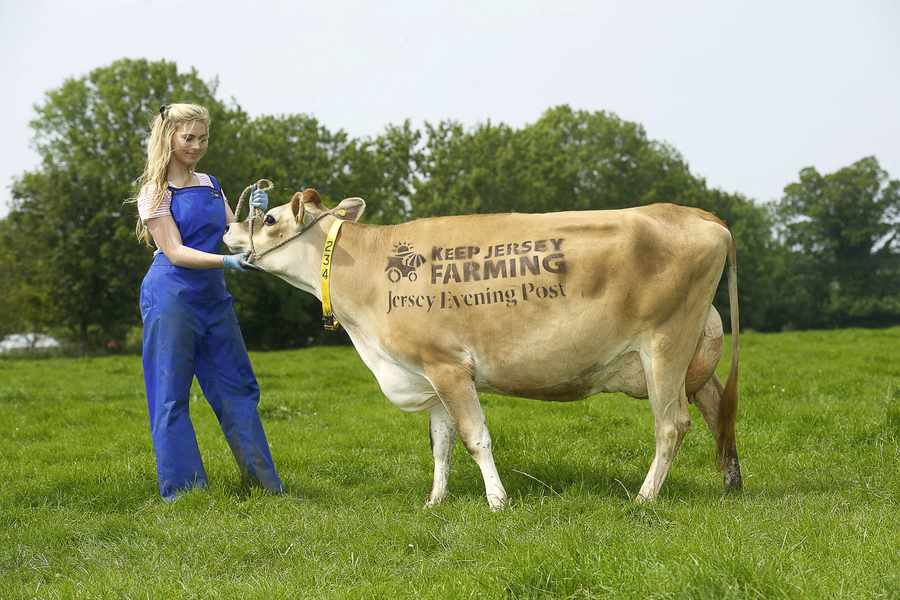
Mrs Le Sueur Rennard built up her herd, the Heritage Herd of 26 milking cows plus heifers and a bull, over a lifetime in farming.
It will now be managed by father and daughter Paul and Becky Houzé, who run a 200-head conventional dairy herd in St Saviour.
Miss Houzé, Miss Battle of Flowers 2012, returned from studying agriculture in the UK and America two weeks ago to work on the family farm.
Mrs Le Sueur Rennard farms 160 vergées of fields around the Island with the cattle grazing close to the farm in St Saviour.
The remaining land is used to grow feed, all according to organic principles as governed by the UK’s organic certification body, the Soil Association.
Mr Houzé said: ‘We have been contracted by the JMMB to run the farm and we are going to maintain its organic status and that is the reason for us taking on the farm.
‘Sadie will remain the owner of the farm and the herd, but we will be responsible for the management and abiding by the Soil Association rules and regulations.’
An independent herd in St Peter at Darren Quénault’s Classic Farm dropped its organic status in January this year.
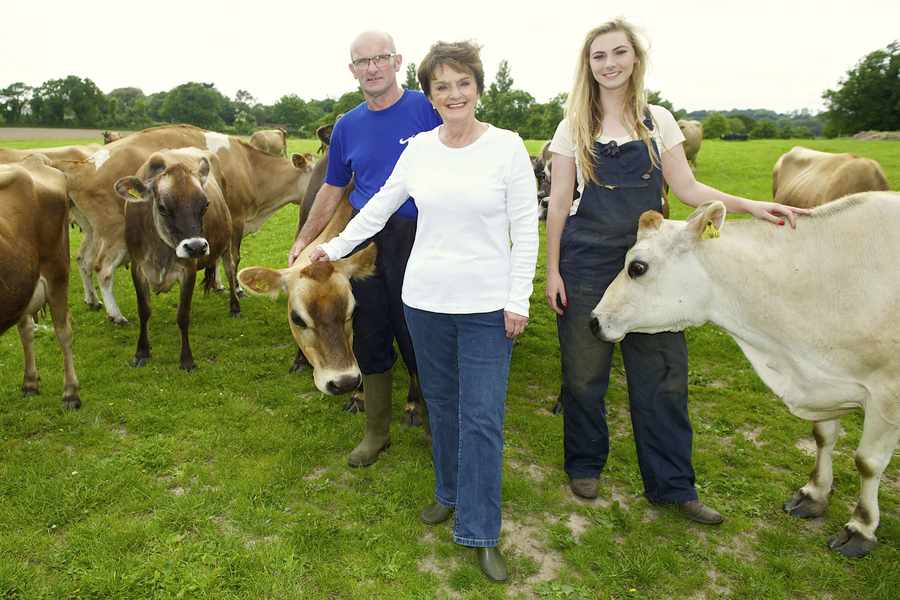
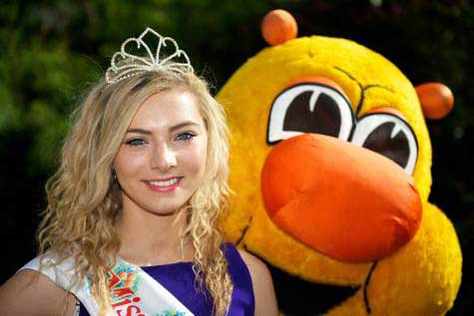
THE importance of the JEP’s Keep Jersey Farming campaign is made all too clear today. The Jersey Milk Marketing Board – which runs Jersey Dairy – has had to step in to save the Island’s last organic milking herd owned by St Saviour Constable Sadie Le Sueur Rennard, who is as passionate about her cows as she is about Jersey and its farming community.
As she says today, the loss of the 26 milkers would result in the importation of organic milk and be the beginning of the end for the iconic Jersey cow.
She is right – the loss of her herd could be the thin end of a very sad wedge.
But this is not just a story of an industry standing on the brink. There is a silver lining to the looming clouds.
Today’s front-page report highlights the strength of the farming community, which is now a fraction of what it once was, and the fact that there are passionate young people who are keen to take the industry forward to a sustainable future.
Mrs Le Sueur Rennard’s herd is to be managed by Paul Houzé and his daughter Becky, a former Miss Battle of Flowers, who recently returned to the Island from agricultural college in the UK. Becky (22) and her peers represent a new wave of hope for a historic part of Jersey life of great economic, cultural, social and environmental value.
These members of the farming community have come together to protect more than just their bottom lines.
They are the champions of a way of life which we must all help to save.
They are the custodians of the parts of our Island which are still green and beautiful, of an industry which connects us to the land in the cyber unreality of the digital world.
Readers can show their support for Mrs Le Sueur Rennard, the Houzés and many others by backing our Keep Jersey Farming campaign, which is supported by the RJAHS, Jersey Farmers Union and Genuine Jersey, and displaying a sticker in their cars.
The free stickers can be picked up from the JEP’s reception at Five Oaks and are now available at farm shops around the Island and the Royal Jersey Showground in Trinity.
If you run a shop or business and would like to give out the stickers, email editorial@jerseyeveningpost.com.

JERSEY’S countryside, in all its variety, is our greatest asset but it is generations of Islanders who have worked its soil that have made it what it is today.
In exploiting the Island’s rich natural assets and ideal growing conditions, local families – many of whom can trace their roots back to William the Conqueror – have created a diverse rural landscape.
Finance may be the dominant factor in the Island’s economy but people don’t come here to see banks and office blocks no matter which top-notch architect designed them.
Nor do they come here because we’ve got superfast broadband or a growing digital sector; they come because of the environment, heritage and a worldwide reputation for top-quality dairy products and fresh produce.
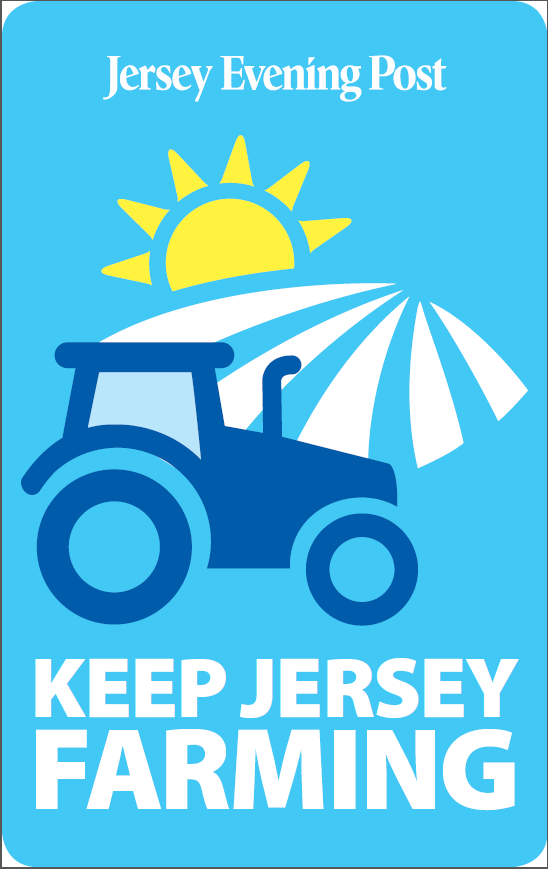
As finance has gained in prominence, support for agriculture has diminished as politicians look outside the Island to further diversify the economy.
However, it is not all doom and gloom in the Island’s oldest industry.
A revitalised dairy sector, maximising the international reputation of the Jersey cow, is also looking outwards to exploit new markets with encouraging early successes.
The Jersey Royal remains the premier crop and the Island’s biggest export, but its production and profits are controlled by two of the UK’s largest agro-businesses and not in the hands of individual local farmers.
That may upset the traditionalists but it makes sense in terms of brand profile and marketing power in an industry driven by price and consumer demand for cheap food.
The reliance on a single crop has its downsides and a lack of rotation, threats from pests and disease, and the impact on water quality are issues the industry must address.
Integral to the countryside mix – and the Island’s food security – are the farmers who grow a variety of other crops and who have diversified into niche markets such as livestock and egg production.
Together, they will never be able to meet the Island’s demand for fresh produce but their activities are as vital to maintaining the Jersey way of life in an increasingly modern world as they are to keeping fresh local produce in the shops.
And there will always be a market for local produce, and not just from ‘foodies’ who frequent farm shops and roadside stalls, but also from the supermarket chains that dominate the retail food market.
Jersey’s farmers, in particular those who have the confidence to invest in the future, and the young generation embarking on careers in agriculture, need all our support to succeed – which is why the JEP is launching its Keep Jersey Farming campaign to back the industry.
Our campaign is not just about buying local; it is about reconnecting the public with a way of life that has defined and influenced local culture and the environment for centuries.
It will profile farmers, highlight the issues that affect the industry and promote seasonality and provenance.
Farmers are the custodians of the countryside, which is under threat from competing land uses and over-development.
They need your support to survive.
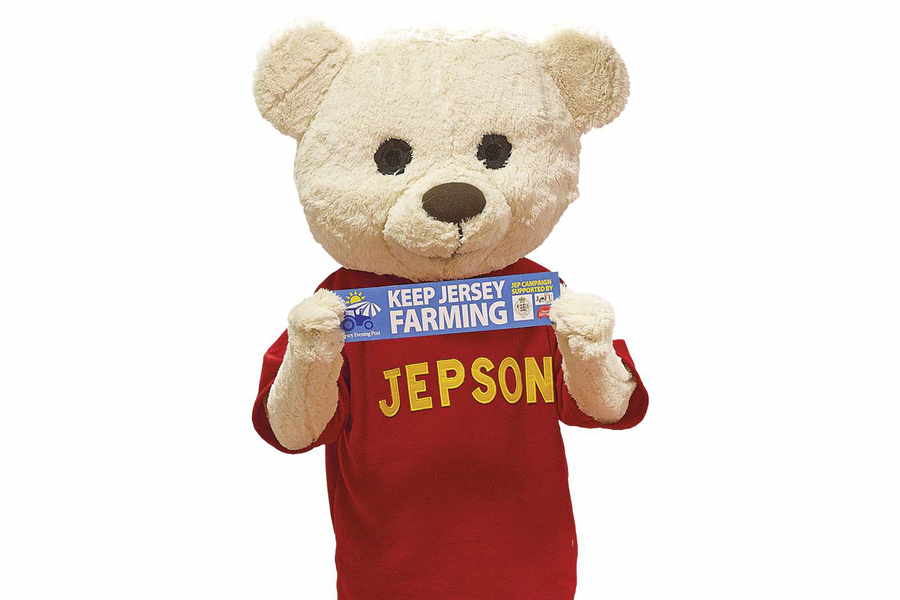
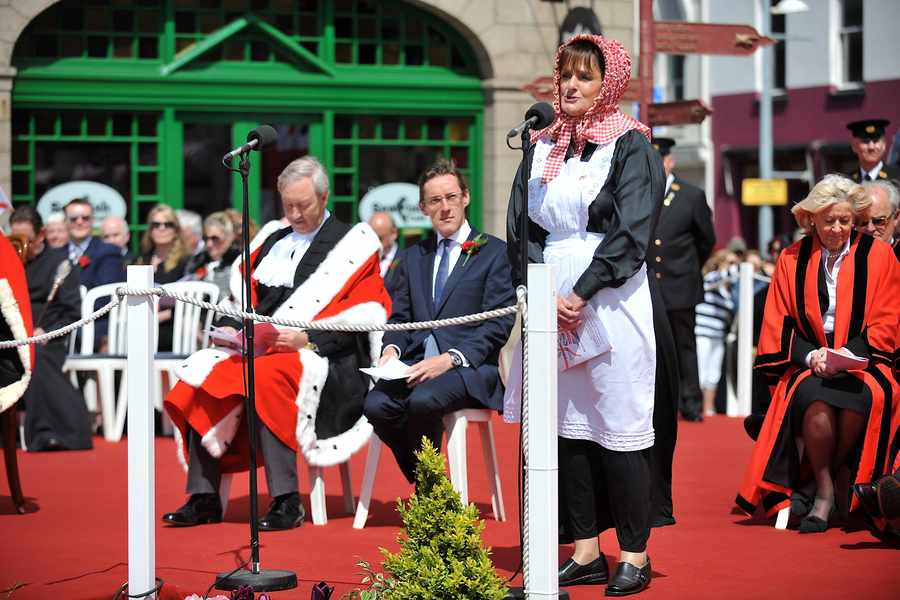
WHEN people hear Sadie Le Sueur Rennard sing Beautiful Jersey, they quite often have a tear in their eye – but then so does Sadie.
As the St Saviour Constable says, it’s a very emotional song.
‘I try not to cry, but it’s difficult because it’s a very moving song. On Liberation Day you always get people who will cry, it gets people so upset, but I’m not too bad now,’ said Sadie, who most recently sang the song at the 70th anniversary of the liberation of the internment camp at Bad Wurzach.
And she will be singing Beautiful Jersey during today’s celebrations in a number of locations, including at the main event following the decision to keep the Liberation ceremony in Liberation Square.
‘From not singing at all, I’m now singing in Liberation Square at 11 o’clock, then going to the Age Concern lunch to sing, then to the People’s Park where I’ll be singing at about half past three,’ said Sadie.
‘At this time of year I get wheeled out to sing Beautiful Jersey, then I get wheeled away again!
‘But people have no idea the honour that I feel to be able to go out there and sing.’
Sadie was also invited by former evacuees to sing for them.
‘They said as they came back from the UK and rounded Noirmont Point that they all burst into song and sang Beautiful Jersey, so they’ve asked me to sing it!
She can trace her first major performance of the song to a Liberation event 20 years ago.
‘I have the late Ian Toole and his family to thank for that,’ she said. ‘We had a fantastic celebration at Fort Regent for the 50th anniversary of Liberation. We had a horse and cart, pigs and cows, and the event showed life through the Occupation. Ian asked if I’d sing Beautiful Jersey.’
Sadie starts to choke up at the memory.
‘See, I get upset even now! I had to stand on stage with one of the children in my arms and I started to sing.
‘All the extras who were playing German soldiers came running through Fort Regent and I thought, this is what it must have been like. I found it very moving.
‘When I sang it years later for the opening of the Island Games, we had to record it in the end because I couldn’t get though it without crying!’
Sadie learned the song from her mother, Eileen, and it brings back floods of memories for her.
‘When I’m singing it I think about the different things that have gone on in the past,’ she said. ‘My mum and dad were here during the Occupation and they lost friends. They also helped people – they used to leave food in a hedge for a Russian man.’
Her paternal grandfather, John Le Sueur, lived at Clairval Farm in St Saviour, where his son John (known as Jack) was born. In time, Jack married Eileen (née Le Marquand) and their children, Sadie and Guy, were also born at the farm.
Sadie, who separated from husband Jonathan last summer, still lives at the farm with her Irish setter Jackson and has taken her late parents’ name, calling herself Sadie Le Sueur Rennard.
As well as being the Constable of St Saviour, she is continuing the family tradition of dairy farming and is the only organic dairy farmer left who sends organic milk to the dairy.
It was Jack and Eileen who started the family herd of Jersey cows, having progressed from a smallholding with a few cows, chickens and growing tomatoes.
Sadie’s father spent much of his life accompanying shipments of cattle to the United States, so it was largely left to Eileen to look after the cows, with help from Sadie.
‘I always loved the cows. But none of my children or grandchildren are interested in the farm.
‘They’ll lend a hand, but they’ve all got careers. Nobody wanted to come into farming,’ she said.
She began her own career working for the old Channel Airways as a member of the ground staff, then worked in sales for Christian Dior and Chanel.
She gradually took over the farm when she began helping her father more and more.
The farm currently has 55 cows and two bulls and also has a number of ‘retired’ cows (old ladies, as she calls them), the eldest being 22.
While Sadie has a herdsman to tend to the cows, she is very busy in her other role of politician.
She initially stood for Constable only because of opposition to a possible development of the field opposite St Saviour’s School.
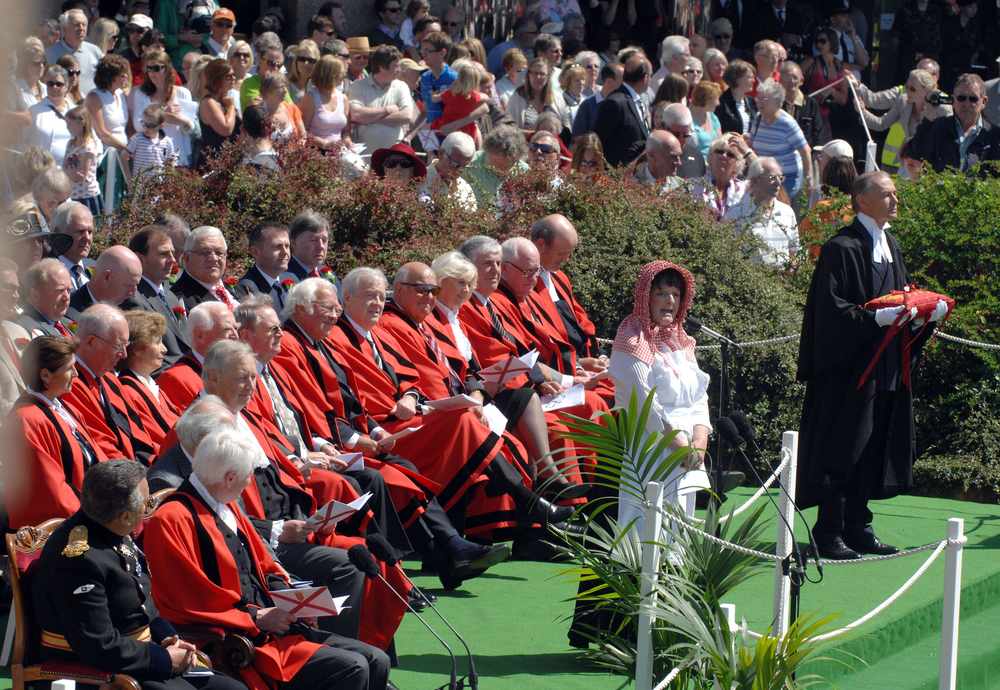
At a packed public meeting, she declared she would stand against standing Constable Peter Hanning if that would save the field.
‘All hell broke loose at the meeting,’ she said. ‘We didn’t want the development to happen.
‘I was so angry that I stood against him. I wasn’t even in the honorary system and hadn’t done anything other than go to parish events, so it was a surprise to a certain degree.’
She was elected in October 2011 and stood unopposed in last year’s elections.
On top of all that, Sadie still finds time for her other major passion, country music, and visits Nashville every year.
‘I’ve been going since I was 18 and I love the place. I was made an honorary citizen of the state in 1974 and was given the keys to the city.
‘Now when I go, it’s like going home. I even sing Beautiful Jersey in Nashville and they love it!’
And she really hopes that Beautiful Jersey will continue to be sung by the generations to come.
‘I love the Island very much and I am disappointed sometimes to see the way it’s going.
‘But Beautiful Jersey is lovely. It must not die.’






